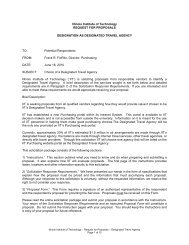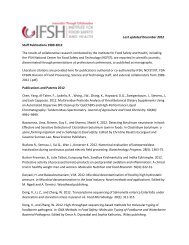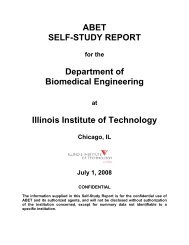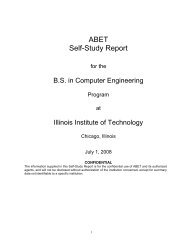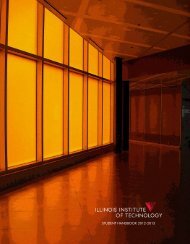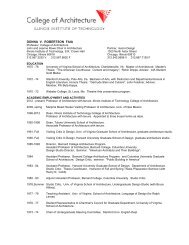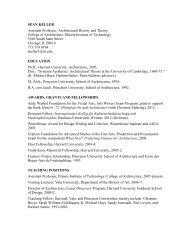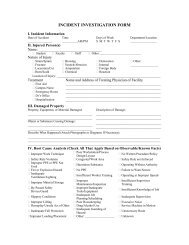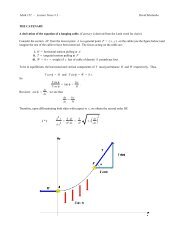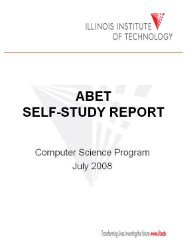Undergraduate Bulletin - Illinois Institute of Technology
Undergraduate Bulletin - Illinois Institute of Technology
Undergraduate Bulletin - Illinois Institute of Technology
Create successful ePaper yourself
Turn your PDF publications into a flip-book with our unique Google optimized e-Paper software.
Electrical and Computer Engineering<br />
Electrical Engineering<br />
Department Website: www.iit.edu/engineering/ece<br />
Electrical engineering is concerned with the generation,<br />
transmission, and utilization <strong>of</strong> electrical energy and with<br />
the transmitting and processing <strong>of</strong> information. Electrical<br />
engineers are involved in the analysis, design, and production<br />
<strong>of</strong> electric power, radio, radar, television, computing,<br />
telecommunication, control, and information systems.<br />
These engineers find solutions to the challenging technical<br />
problems that arise in our rapidly changing society. They<br />
impact virtually every aspect <strong>of</strong> daily life, as evidenced<br />
by examples such as wireless communications, audio and<br />
video equipment, power distribution, computerized traffic<br />
control, noise pollution monitoring and abatement, and<br />
medical instrumentation.<br />
The Electrical Engineering curriculum puts emphasis on<br />
both theory and practical applications by providing a solid<br />
background in engineering science and mathematics, followed<br />
by a sequence <strong>of</strong> core courses in electrical engineering.<br />
Design skills are fostered in the pr<strong>of</strong>essional elective courses<br />
in the senior year, along with the project experience instilled<br />
by Interpr<strong>of</strong>essional Projects (IPROs).<br />
The objectives <strong>of</strong> the ECE undergraduate Electrical Engineering<br />
program are to produce electrical engineering<br />
graduates who are prepared to:<br />
• Enter their pr<strong>of</strong>ession and make intellectual contributions<br />
to it.<br />
• Embark on a lifelong career <strong>of</strong> personal and pr<strong>of</strong>essional<br />
growth.<br />
• Take advanced courses at the graduate level.<br />
Bachelor <strong>of</strong> Science in Electrical Engineering<br />
Required Courses<br />
Credit Hours<br />
Electrical Engineering Requirements 36<br />
ECE 100, 211, 213, 218, 242, 307, 308, 311, 312, 319<br />
Pr<strong>of</strong>essional ECE Electives 17/20<br />
Mathematics Requirements 24<br />
MATH 151, 152, 251, 252, 333, 474<br />
Physics Requirements 11<br />
PHYS 123, 221, 224<br />
Chemistry Requirement 3<br />
CHEM 122<br />
Engineering Science Course Requirement 3<br />
MMAE 200 or MMAE 320<br />
Computer Science Requirements 4<br />
CS 115, 116<br />
Humanities and Social Sciences Requirements 21<br />
For general education requirements, see page 25.<br />
Science Elective 3<br />
BIOL 107, BIOL 115, MS 201, or CHEM 126<br />
Technical Elective 3<br />
Interpr<strong>of</strong>essional Projects 6<br />
Total Hours 131/134<br />
96



